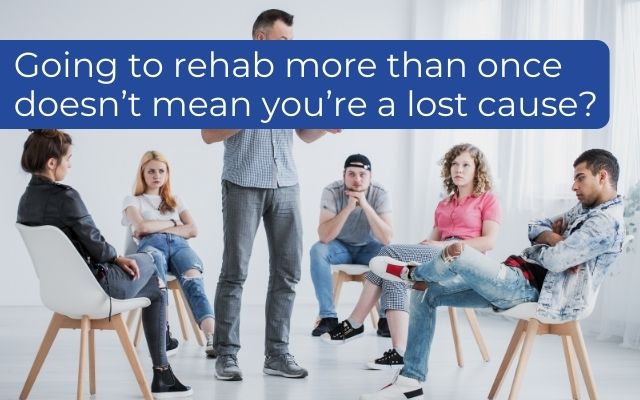
Returning to Rehab Can Be Part of Lasting Recovery
Could returning to rehab after a relapse be an important step towards lasting recovery rather than a sign of failure?
A relapse after treatment can feel like the end of the world or a hopeless situation. But it is not. The reality is that many people require multiple treatment attempts before they find long-term recovery. Relapse is often part of the learning process. It is your choice whether to learn and grow after a relapse or allow it to take you back to active addiction.
This is the fourth post in our blog series 20 things you should know about rehabilitative treatment: What works. This list was compiled by the European Association for the Treatment of Addiction, according to the latest evidence.

Addiction, including alcoholism, is a relapsing disease
Addiction is often described as a relapsing condition and many people relapse after treatment.
The United States’ National Institute on Drug Abuse (NIDA) defines addiction as “a chronic, relapsing disorder characterized by compulsive drug seeking, continued use despite harmful consequences, and long-lasting changes in the brain”.
According to NIDA, between 40 and 60% of people experience at least one relapse after completing rehabilitative treatment. Importantly, these rates are similar to other chronic conditions: Between 30 and 50% of individuals with diabetes relapse after treatment.
However, it is important to note that a relapse is not necessarily inevitable and many rehab programmes develop strong relapse prevention strategies for their clients. Relapse prevention programmes have been shown to greatly reduce the chances of relapse.
But it is important that clients are aware that a relapse does not need to be a hopeless catastrophe, unless he or she makes it one. A person can come back from a relapse and should get help as soon as possible instead of allowing the relapse to carry on towards disaster.
Experiencing a relapse after treatment also does not mean you have wasted your money and time. The addict or alcoholic learns and grows during a quality and evidence-based treatment programme, a relapse does not take away that knowledge and growth, the relapse might simply be a part of the individual’s process in accepting they are an addict and that recovery is the solution.










Relapse doesn’t mean that further treatment won’t work
Evidence shows that a relapse does not signify that treatment failed or that further treatment won’t be beneficial.
Experts believe a relapse should not be treated as a personal failure but as a sign that the treatment approach should be adjusted or reinforced. For example, a relapse after inpatient primary treatment might signify a person needs to be admitted to a longer-term secondary care programme. If the individual relapsed after completing an outpatient programme, they should consider trying inpatient treatment.
A relapse could also signify that the treatment team should adjust the individual’s relapse prevention strategy using knowledge gained from the recent relapse.
The reality is that addiction is an incredibly complex problem and, as such, a number of people need multiple admissions to treatment before they find long-term sobriety.
Addiction disrupts a person’s behaviour and how their brain works. Depending on the severity of a person’s addiction, they may need more intensive treatment than others to override disruptions.
An individual may also need multiple admissions to rehab if they struggle to accept the extent of their problem – if they are still in denial – or if they have a complex history of trauma that needs more therapy to be adequately addressed.
There is evidence that an apparently unsuccessful treatment episode can contribute towards an individual eventually overcoming their addiction in the long term.
Do you need to go to treatment? Contact us for an obligation-free assessment and change your life today.
Going to rehab more than once or returning to rehab after relapse can be a vital step towards lasting recovery and long term sobriety and renewed hope. Changes team counsellors are here to help you.Going To Rehab More Than Once Can Lead To Lasting Recovery








